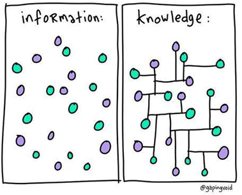Data can help purpose-driven organizations make better decisions and achieve greater impact. This much is agreed upon. However, in a 2016 survey of nonprofit professionals conducted by EveryAction and Nonprofit Hub, only 6% of respondents felt their organizations were effectively using the data at their disposal. In other words, we while we know data is important, we are still struggling to use it.
This is a problem worth solving because of the work that we do. Our missions compel us to be better. We are investing in the social and economic fabric of our neighborhoods, helping those in need, championing inclusion and diversity, and securing a more equitable future for our children and grandchildren. The bottom line is that purpose-driven fields have the most to gain from data.
Admittedly, obstacles persist. We also work in fields that are likely to lack capacity and resources, analytical expertise, and, most of all, time. Fortunately, there are concrete, accessible steps that you can take to make better use of the data you do have.
Data can help organizations make smarter decisions, gain new insights and accelerate progress for the collective good of our communities.
- Understand the difference between information and knowledge.
 I keep this visual framed on my desk to remind myself that there is a big difference between having information and have the right information I need to inform my strategic questions.
I keep this visual framed on my desk to remind myself that there is a big difference between having information and have the right information I need to inform my strategic questions.
Instead of trying to use any and all data points, start with what questions you need to answer to inform your work, and determine if the data you have answers them and what gaps you might need to fill.
- Invest in building your data capacity.
The capacity to collect, analyze and share data will help you make more informed management and strategic decisions, and enhance your ability to effectively tell your story to current and potential donors and funders. It will also improve your ability to communicate with external evaluators.
Increasing your capacity does not mean you have to hire a staff person to focus on data (but if you want to, here are some tips ). Think about investing in a dynamic staff person who can watch YouTube videos on Excel formulas and help you better analyze your data (that is how I got my start!).
- Know where your data lives.
One of the biggest roadblocks to using data effectively is not knowing what data you have, or having your data stored in too many different places. Try to centralize your data as much as you can. For some organizations, Microsoft Excel is a perfectly suitable storage solution, for others a sophisticated database is essential. The type of data you want to collect and the questions you want to answer should drive how store your data.
When it comes to data, it is easy to get caught up in numbers, charts, dollars spent, etc. Behind every metric, however, is a human story. Each number represents a real person who is looking to organizations like ours to make a real difference in their life. Despite the obstacles, there are concrete steps we can take to do more with our data. We can turn information into knowledge in support of our missions. I invite you to explore the Data Playbook and to share your stories of data success!
Rella Kaplowitz is Program Officer for Evaluation and Learning at the Charles and Lynn Schusterman Family Foundation. The Foundation has recently published a Data Playbook an online resource to help organizations of all sizes to use data to assess and communicate the impact of their work.



COMMENTS